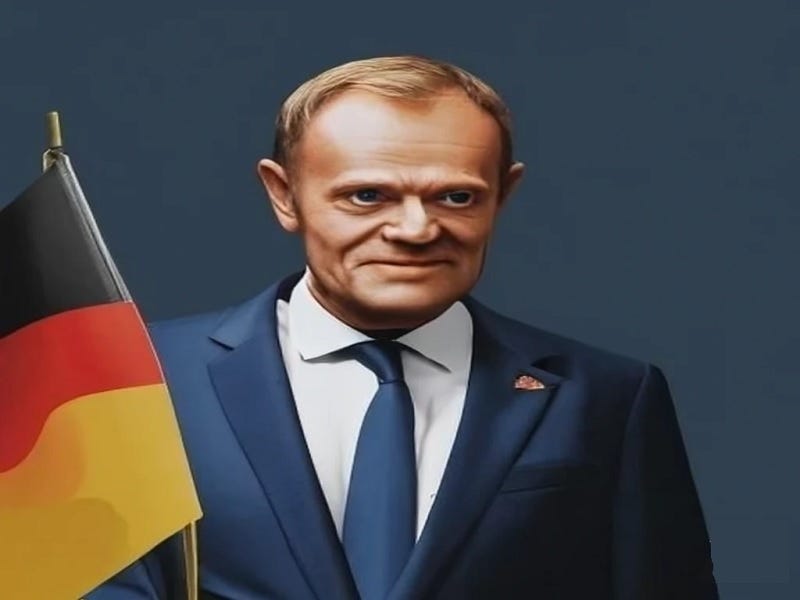The returning premier’s latest remarks are clearly trying to distract from his country’s worst political crisis since the 1980s while simultaneously discrediting his predecessor and those bonafide Polish patriots who’ve soured on Ukraine in recent months as well. The innuendo is that any Pole who doesn’t support a forever war in Ukraine is betraying their country’s national interests, but the reality is the opposite since patriots should support freezing the conflict as soon as possible.
Polish Prime Minister Donald Tusk just declared in an interview that “Every Polish patriot must absolutely recognize” that “There can be no doubts about the war and our commitment, and that of the entire Western world, to Ukraine in its confrontation with Russia.” He then claimed that “situation in Ukraine and on the front is absolutely the number one issue for Polish security.” His comments came ahead of a planned trip to Kiev after the Ukrainian Conflict began to wind down late last year.
His appeal to Polish patriots to support Ukraine is an attempted distraction from his country’s worst political crisis since the 1980s, which was provoked by his seizure of national media and the arrest of two former ministers on legally dubious pretexts. Readers can learn more about his de facto liberal-globalist coup, which also involves importing illegal immigrants that could easily include those civilizationally dissimilar ones who don’t want to assimilate and integrate, in the preceding hyperlinked analysis.
The more specific context in which Tusk tried to spin support for Ukraine concerns the ongoing blockade of that country’s border by a group of Polish farmers and truckers, who are protesting the impact that EU policies in favor of Kiev have had on their livelihood. Former Prime Minister Mateusz Morawiecki also admitted in an interview with British media last week that the Ukrainian Conflict “is not going in the right direction” after Kiev’s counteroffensive “was not successful” in turning the tide.
While he claimed that the silver lining is that the West has united against Russia, the overall tone of his comments was negative and implied exhaustion with this conflict, which aligns with the emerging Mainstream Media narrative over the past one-quarter of a year. Tusk’s tone was altogether different, and he even said that he won’t tolerate so-called “anti-Ukrainian sentiment” in his administration, unlike what he alleged had characterized Morawiecki’s near its end.
Taken together, the returning premier’s latest remarks are clearly trying to distract from his country’s worst political crisis since the 1980s while simultaneously discrediting his predecessor and those bonafide Polish patriots who’ve soured on Ukraine in recent months as well. The innuendo is that any Pole who doesn’t support a forever war in Ukraine is betraying their country’s national interests after he also said that “As long as Ukraine is at war with Russia, we are relatively safe.”
Objectively speaking, the reality is actually the opposite since a protracted conflict will further drain Polish economic and military resources together with increasing the risk of “mission creep”, which could be accelerated by a Russian breakthrough along the front or another wayward missile hitting Poland. Nevertheless, Tusk is doubling down on Ukraine despite most of the West distancing itself from it, and this is arguably being done to advance German hegemonic interests instead of Polish national ones.
The former ruling party’s chairman Jaroslaw Kaczynski repeatedly warned that he’s a “German agent” who was sent back from Brussels, where he earlier served as the European Council president, at Berlin’s behest in order to do its bidding in his homeland. In the Ukrainian context, perpetuating the conflict serves to imbue a sense of urgency to a leading German NATO official’s plan for a “military Schengen” that would in essence result in the large-scale return of that country’s troops to Poland.
They could then help Tusk retain control if he comes to distrust the local police, members of the intelligence community, and/or the armed forces in the event that the joint the new Solidarity movement that the conservative-nationalist opposition is unofficially trying to form. With this in mind, it’s arguably the case that the most patriotic position that any Pole can have at present is to support peace talks aimed at freezing this conflict exactly as NATO’s former Supreme Commander suggested.
Admiral James Stavridis proposed this solution in an op-ed for Bloomberg in mid-November, which he put forth with the sincere intent of advancing the West’s collective interests, including Poland’s. Tusk’s latest remarks scandalously imply that NATO’s former Supreme Commander is flirting with threats to “Polish security”, which can only be safeguarded “As long as Ukraine is at war with Russia”, but there’s no truth to what he’s hinting about him or those Poles who share his envisaged solution.
It's actually insulting to insinuate anything of the sort, as well as the notion that Poland can only remain “relatively safe” as long as there’s an armed conflict raging in a neighboring nation. The only reason why Tusk would resort to such rhetoric is out of desperation to discredit his opponents and distract from his country’s worst political crisis since the 1980s, which shows that he’s feeling the heat after last week’s large protest in Warsaw and that patriots should thus intensify their efforts to protect Polish democracy.




